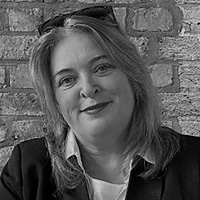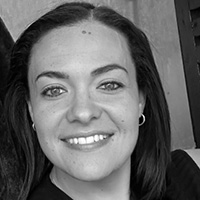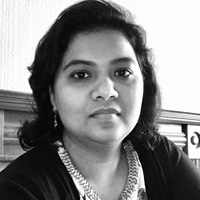 Madeleine Howard has 30+ years’ financial services experience, including multiple engagements as a Technology Program/Portfolio Manager, ePMO and Portfolio Governance Lead and Account Engagement Lead. She has driven OSS Management capability engagements for the firm and leads the Technology Delivery capability for the Capco Technology Practice. Madeleine is also a passionate key sponsor of Capco’s Women In Tech community and has been recognised in the past as ‘coach of the year’ within the UK business.
Madeleine Howard has 30+ years’ financial services experience, including multiple engagements as a Technology Program/Portfolio Manager, ePMO and Portfolio Governance Lead and Account Engagement Lead. She has driven OSS Management capability engagements for the firm and leads the Technology Delivery capability for the Capco Technology Practice. Madeleine is also a passionate key sponsor of Capco’s Women In Tech community and has been recognised in the past as ‘coach of the year’ within the UK business.
I can only explain the BYAW culture through my lived experience and observations, and for me, it’s a way of operating naturally and should feel a part of the fabric of the company. Even in the most difficult times, and the last four years have tested the world’s financial market, the ethos that you are heard, can express your needs and act with authenticity whilst respecting your personal values and boundaries has remained.
When I joined Capco 11.5 years ago, the BYAW initiative had not been officially named or even defined as such, however, the message I felt and received from the first week was ‘You do not have to be like everyone else to be accepted and to perform well here’. It was powerful coming from two decades in the banking industry, which (unlike today) celebrated uniformity and an identical public/ and internal corporate identity.
The world has evolved rapidly over the last 35 years and luckily, we see the power in disruption and alternative thinking, as opposed to safety and comfort in similarity. Fundamentally we see that it is individuals that have taken the risk to be wrong and do things differently, which has accelerated change. Individuals can only do that effectively if they know they can bring their true selves to the workplace and not be afraid to try new and exciting things and be supported, however ‘wild’ the idea may be!
For those who are considering similar initiatives at their companies’, getting started begins with everyone. However, leadership being prepared to show their authentic selves and embracing this as not just a concept scribbled down in a mission statement is key. Leadership operating and expressing BYAW values day to day, and then embedding this by bringing individuals into your firm who replicate that support, openness and appreciation of the abilities and the gifts we all have.
Recognising those individuals in your firm who make decisions for the good of their colleagues and support their teams/people is vital to embedding that culture and making those decisions using a compassionate and humane lens.
It is not enough to create policies and marketing and expect the change to happen; it starts with understanding and trusting your people, challenging yourself and being open about what is the right thing for the individual not just the company.
I would also say to those creating this environment to remember that vulnerability is not a weakness. A company that embraces failure will tap the potential of its people and receive loyalty back for that care and support. When you are not afraid to be vulnerable, you can express ideas freely and in a safe environment. Vulnerability breeds innovation and a sense of belonging which then enables individuals to be their true selves.
A positive company response to vulnerability then multiplies that sense of belonging and loyalty. From my experience, people pay kindness forward, honesty and trust they have directly received but consistency is needed. Right or wrong, we all know that a bad experience or complaint creates a wider audience than a good experience or compliment. The same applies when driving a BYAW culture, it is not a ‘one and done’ policy, but a constantly embedding and evolving culture.
That being said, some key learnings are that we do not always get it right - and recognising that fact is also being truly authentic, which is a cornerstone of BYAW. It’s not about being right 100% of the time it’s also identifying and accepting where you have got it wrong.
The old expression ‘to err is human, to forgive divine’ I apply to myself and my interactions regularly - we do not come into this world as complete articles and who said that we need to be? And why would you expect others to be? I also mean this from an individual’s perspective within the company also - being open, authentic and vulnerable does not negate accountability for bringing the best version of yourself to work. There is a level of commitment and investment we all have to share with our employers, and if you feel that it is not there, or you cannot be honest with those shaping your future, it would be a constant battle to bring your true self to work.
Enabling our people to showcase their talents, vulnerabilities, mistakes, and achievements is something we strive for. Ensuring they feel comfortable in admitting they don’t know something, asking for help genuinely or acknowledging you’ve made a mistake are simple things you can do to be more authentic at work which breeds the BYAW culture.
 Madeleine Howard has 30+ years’ financial services experience, including multiple engagements as a Technology Program/Portfolio Manager, ePMO and Portfolio Governance Lead and Account Engagement Lead. She has driven OSS Management capability engagements for the firm and leads the Technology Delivery capability for the Capco Technology Practice. Madeleine is also a passionate key sponsor of Capco’s Women In Tech community and has been recognised in the past as ‘coach of the year’ within the UK business.
Madeleine Howard has 30+ years’ financial services experience, including multiple engagements as a Technology Program/Portfolio Manager, ePMO and Portfolio Governance Lead and Account Engagement Lead. She has driven OSS Management capability engagements for the firm and leads the Technology Delivery capability for the Capco Technology Practice. Madeleine is also a passionate key sponsor of Capco’s Women In Tech community and has been recognised in the past as ‘coach of the year’ within the UK business. 


